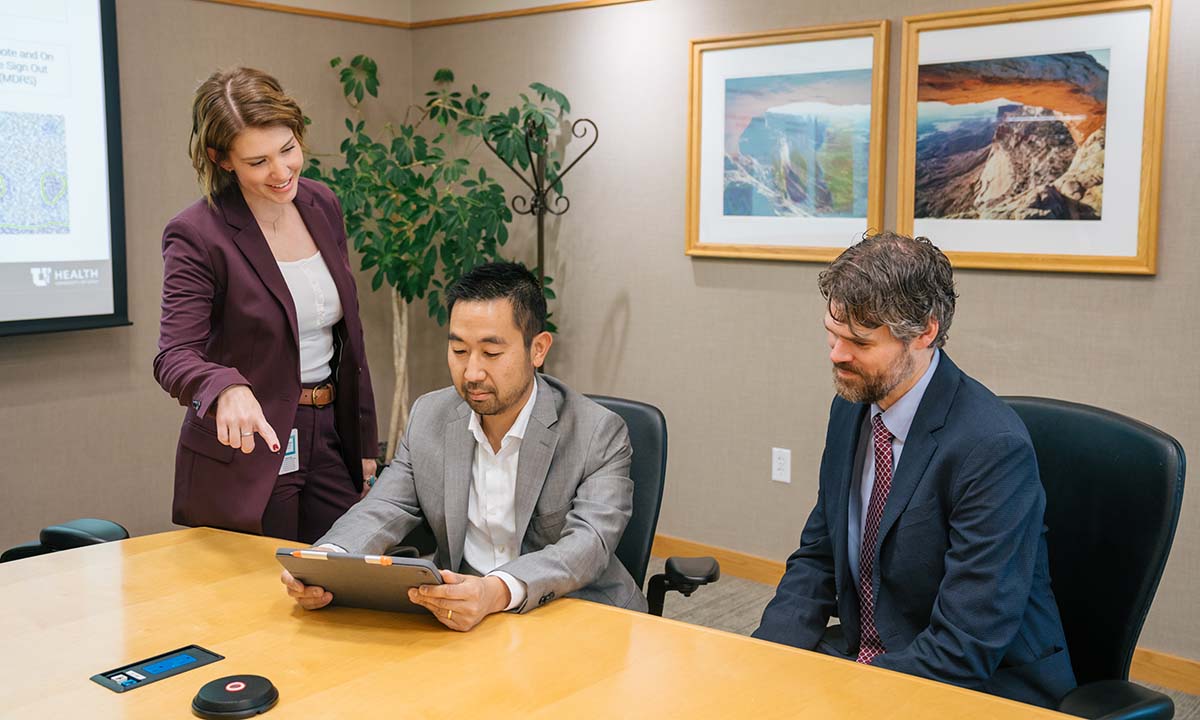
Founding members of the new Institute for Research and Innovation in Diagnostic and Precision MedicineTM collaborate. From left, Erica Clyde, MBA; Robert S. Ohgami, MD, PhD, FCAP; and Hunter Best, PhD, FACMG.
ARUP Laboratories will have a strong presence at this year’s annual Association for Molecular Pathology (AMP) Meeting and Expo in Salt Lake City, November 14–18. Several of our pathologists are scheduled to present their recent contributions and innovations in the field of molecular pathology.
Sherin Shaaban, MD, PhD, FACMG, medical director of Pharmacogenomics and Molecular Genetics at ARUP and assistant professor in the University of Utah Department of Pathology, will speak on the topic, “Machine Learning Applications in Healthcare and Considerations for Building Effective Models,” on Saturday, November 18. Shaaban’s research and academic interests focus on the validation and implementation of pharmacogenetics testing, pharmacogenetics in precision medicine, and molecular genetic testing for rare inherited diseases.
Joshua F. Coleman, MD, ARUP’s subspeciality director for Solid Tumor Next Generation Sequencing and associate professor in the University of Utah Department of Pathology, is scheduled to participate in a panel discussion titled, “Provider-Friendly Molecular Biomarker Reports,” on Saturday, November 18. Coleman completed his residency in anatomic and clinical pathology at the Cleveland Clinic, followed by fellowship training at the University of New Mexico and the University of Utah.
Jay L. Patel, MD, MBA, ARUP’s vice president of PharmaDX and Clinical Trials and an associate professor in the University of Utah Department of Pathology, is scheduled to moderate the session titled, “Economic Challenges of Delivering Molecular Diagnostics for Patients: PAMA, New Codes, and Prior Authorization,” on the morning of November 16. Patel received his medical degree from the University of Arizona and then completed his residency at the University of Utah and a hematopathology fellowship at Stanford University.
Recent research from ARUP experts will also be featured in the following AMP abstracts and poster sessions:
- Improving Systemic Mastocytosis Diagnosis With a Single-Well Multiplexed Assay for Detection of Hereditary Alpha Tryptasemia Genotypes
Malia J. Deshotel, PhD, et al.
Abstract ID 1577089
- TPMT and NUDT15 Genotyping, TPMT Enzyme Activity and Metabolite Determination for Thiopurines Therapy: A Reference Laboratory Experience
Sherin Shaaban, MD, PhD, FACMG; Yuan Ji, PhD, DABCP, FACMG, et al.
Abstract ID: 1576450
Poster Number G018
- Utility of Using a 7-Deletion Assay to Confirm Ambiguous Large Deletions from MPLA-Based HBA Testing
Ping Yu; Yuan Ji, PhD, DABCP, FACMG, et al.
Abstract ID: 1577313
Poster Number G072
- Managing Discrepant Sex Information During Clinical Molecular Genetic Testing – A National Reference Laboratory’s Perspective
Yuan Ji, PhD, DABCP, FACMG, et al.
Abstract ID: 1577010
Poster Number G027
- Identification of a Novel RPS7 Non-Coding Variant in a Rare Form of Diamond-Blackfan Anemia by Whole Genome Sequencing
Ting Wen, MD, PhD; Pinar Bayrak-Toydemir, MD, PhD, FACMG, et al.
Abstract ID: 1575832
ARUP Laboratories’ new Institute for Research and Innovation in Diagnostic and Precision Medicine™ (R&I Institute) will also have significant involvement in the conference.
Robert S. Ohgami, MD, PhD, FCAP, vice president of ARUP’s R&I Institute, said the company has launched a digital pathology imaging center, which scans slides and builds databases for clients but also offers annotation and interpretation. ARUP is seeking to collaborate with partners who want consultative expertise from ARUP’s 100-plus medical directors to codevelop studies and conduct cutting-edge research, including research using applied artificial intelligence (AI).
“We have a team of machine learning, artificial intelligence experts, software developers, data analysts, bioinformatics specialists. … We have the capability to codevelop algorithms,” said Ohgami. ARUP’s applied AI team has developed solutions for automating flow cytometry, which Ohgami said makes workflows more efficient. “Computer algorithms guide us as to whether a certain specimen is [an] acute leukemia or a B-cell neoplasm and then [we are] able to triage the case appropriately for additional workup,” he said.
Ohgami was recently appointed to serve as an associate editor for the Journal of Molecular Diagnostics, which publishes original papers on scientific advances in molecular diagnostic medicine. He received his medical degree and doctorate from Harvard University, and then completed his residency, a clinical fellowship in hematopathology, and a postdoctoral fellowship at Stanford. He is a professor of pathology at the University of Utah School of Medicine and will be available to connect with AMP attendees during the expo.
Other ARUP pathologists and consultants will be available to answer questions in ARUP’s booth, #1329. To see a schedule of their availability, visit https://www.aruplab.com/amp-2023#schedule.
Bonnie Stray, bonnie.stray@aruplab.com

















